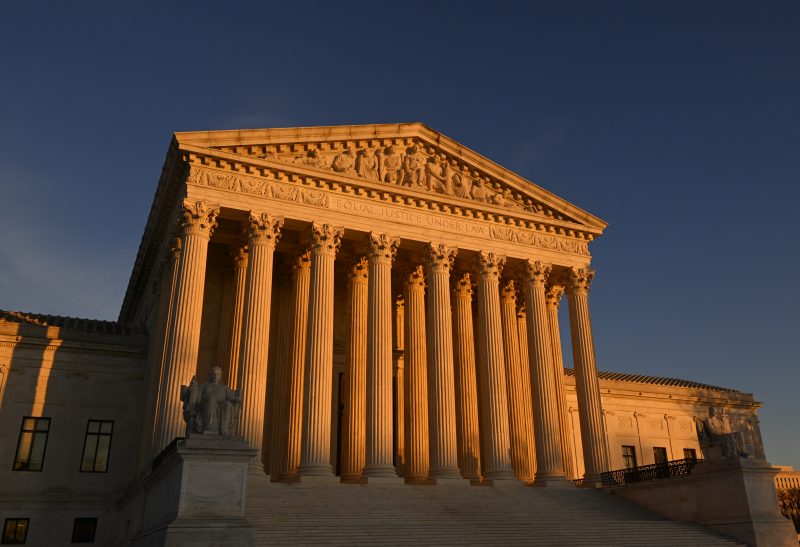The Supreme Court on Monday refused to take up a challenge to a state law in Washington designed to protect LGBTQ+ youths from “conversion therapy,” a decision that drew dissent from three conservative justices.
More than 20 states and the District of Columbia restrict mental health counseling that attempts to change a young person’s gender identity or sexual orientation.
A Christian marriage and family counselor who helps clients with gender identity told the court that the Washington law, which limits the practice of “conversion therapy,” censors his conversations with clients in violation of the First Amendment. The U.S. Court of Appeals for the 9th Circuit upheld the law, which it said prohibits certain professional conduct, not speech.
As is customary, the Supreme Court majority did not explain its decision Monday to leave the 9th Circuit ruling in place. Three justices — Clarence Thomas, Samuel A. Alito Jr. and Brett M. Kavanaugh — said they would have taken the case.
In written dissents, Alito and Thomas said the case presents important questions of free speech that have divided lower courts.
“There is fierce debate over how best to help minors with gender dysphoria,” Thomas wrote.
Brian Tingley, the family counselor, told the court that he seeks to help young people with gender dysphoria who “want to be comfortable with their biological sex.”
Washington and other jurisdictions have passed laws barring such counseling because of the harmful, traumatic effects on patients that most medical associations say comes from counseling a minor to change his or her gender identity or sexual orientation. The premise of conversion therapy, according to medical experts, is that same-sex attraction or nonconforming gender expression and identity are pathological — the result of physical or mental illness.
California was the first state to ban conversion efforts in 2012, according to data from the nonprofit Movement Advancement Project. Since then, 26 states have instituted partial or full bans on conversion therapy for minors.
The state law in Washington, passed in 2018, prohibits licensed therapists from practicing conversion therapy involving minors. It includes fines up to $5,000 for each violation, possible suspension from practice, and revocation of the counselor’s license. The law does not apply to religious counseling, and no enforcement actions have been taken, according to the state’s filing.
“Evidence-based medical consensus is that conversion therapy is not a safe or effective treatment for any condition and that the practice of conversion therapy on minors falls below the prevailing standard of care,” Attorney General Robert W. Ferguson (D) told the court. The practice “puts minors at risk of serious, long-lasting harms, including increased risk of suicide and depression.”
In Thomas’s five-page dissent on Monday, he said Washington’s ban had “silenced one side of this debate” by restricting the First Amendment rights of medical professionals. “Licensed counselors cannot voice anything other than the state-approved opinion on minors with gender dysphoria without facing punishment. The Ninth Circuit set a troubling precedent by condoning this regime,” Thomas wrote.
The 9th Circuit ruled last year that the law does not regulate speech because counseling is a type of medical treatment and professional conduct that can be regulated as a health-care practice.
In contrast, the U.S. Court of Appeals for the 11th Circuit found laws in Florida that restrict conversion therapy to be unconstitutional, ruling that they prohibited certain speech.
“The perspective enforced by these local policies is extremely popular in many communities,” Judge Britt Grant wrote in a concurring 11th Circuit opinion. “And the speech barred by these ordinances is rejected by many as wrong, and even dangerous. But the First Amendment applies even to — especially to — speech that is widely unpopular.”
In a statement Monday, an attorney with the Christian legal organization Alliance Defending Freedom, which brought the challenge to the Washington law on behalf of the family counselor, called the high court’s decision a disappointment but said the issue “is not going away.”
“This law clearly regulates speech, there is a circuit split on the issue, and 20 other states and the District of Columbia have similar laws,” senior counsel John Bursch said in a statement. “We urge the Supreme Court to take a similar case when the time comes.”
The decision not to take the case was applauded by the Trevor Project, a suicide prevention organization for LGBTQ+ young people. Janson Wu, a senior director, said it “sends an affirming message to LGBTQ+ youth, their families, and survivors while honoring the victims we’ve lost to this abusive practice.”







































